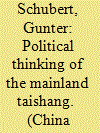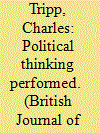| Srl | Item |
| 1 |
ID:
095667


|
|
|
|
|
| Publication |
2010.
|
| Summary/Abstract |
This article explores the political thinking of Taiwanese business people (taishang) and factory managers (taigan) on the Chinese mainland by drawing on qualitative data gathered between 2006 and 2008 in the Pearl River Delta and the Shanghai/ Kunshan metropolitan area. An ideal type of taishang is constructed to explain the major features of their identification with Taiwan, their perspectives on cross-Strait relations, their integration in Chinese society and their self-assessment as political actors in the shaping of cross-Strait relations. An important finding of this study is that the taishang is a rather apolitical figure who does not see much leeway to develop autonomous political leverage. However, this may change gradually as cross-Strait relations have eased significantly since the Kuomintang (KMT) (Guomindang) came to power in mid-2008 and the governments in Beijing and Taibei have experienced a rapprochement.
|
|
|
|
|
|
|
|
|
|
|
|
|
|
|
|
| 2 |
ID:
178540


|
|
|
|
|
| Summary/Abstract |
This contribution develops three major lines of argument. Firstly, it argues that identifying ‘popular culture’ is not simply a definitional exercise but is also purposeful and performative. Secondly, it contends that ‘popular cultures’ are always implicated in power relations in multiple ways. Finally, it maintains that using a performative lens adds to our understanding of the political dimensions of ‘popular cultures’. Taking examples chiefly from the Middle East and North Africa, it avers that studying ‘popular cultures’ highlights the links between the political and the performative, understood both as acting out (theatrical) and as bringing into being (effective). The term ‘culture(s) of the public(s)’ is used to capture the idea of the public as a plurality of active citizens, distinct from the politically charged term ‘the people’. These publics claim space as their right, experiencing agonistic encounters with the different generations, genders, classes, ethnicities that use their own repertoires to assert their claims. Thus, the cultures of the plural public can help to fashion the public self as citizen, but for that same reason can also provoke ferocious repression from those who feel most threatened by such a development.
|
|
|
|
|
|
|
|
|
|
|
|
|
|
|
|